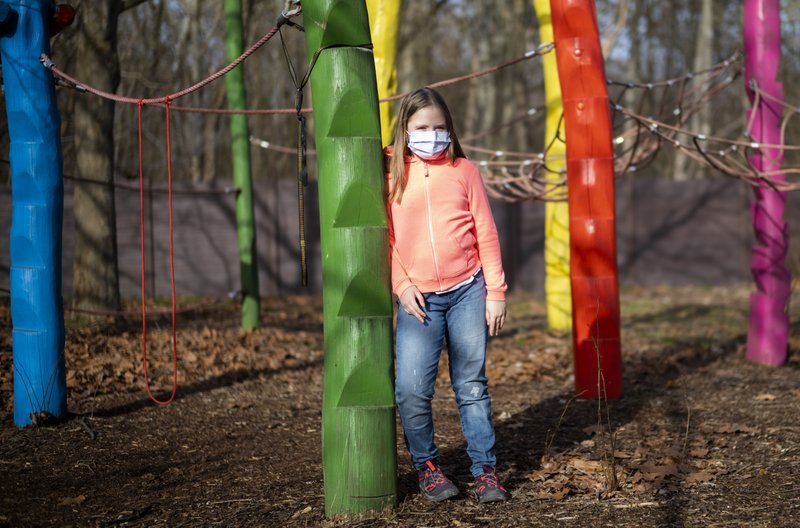
BERLIN (AP) — Pollina Dinner returned to school in Berlin for the first time this week after two months of lockdown. The nine-year-old third-grader was thrilled to see her classmates and teachers again but frets about the coronavirus pandemic’s effect on her life.
“I’m not afraid of the coronavirus, I’m afraid that everything will continue like this — that my school will close again, I won’t be able to see my friends, and that I can’t go to the movies with my family,” the girl said, fingering her blue medical mask and sighing deeply. “And wearing this mask is even worse than all the shops being closed.”
Psychiatrists, psychologists and pediatricians in Germany have voiced growing alarm that school closings, social restrictions and other precautions are magnifying the fear, disruption and stress of the pandemic among Germany’s 13.7 million children and teenagers, raising the prospect of a future mental health crisis.
“We don’t have any long-term studies yet, but there’s lots of anecdotal evidence of a crisis-driven rise in hospitalizations and overflowing psychologists’ practices,” Julia Asbrand, a professor of child and youth psychology at Berlin’s Humboldt University, told The Associated Press.
A recent survey by the University Medical Center Hamburg-Eppendorf found that about one child in three is suffering from pandemic-related anxiety or depression or is exhibiting psychosomatic symptoms like headaches or stomach aches. Children from poorer and immigrant families are disproportionally affected, according to the survey.
Pollina, who immigrated from Russia with her family in 2019, worries about forgetting much of her German since she only speaks Russian at home. She’s one of 150 youngsters from underprivileged families who, before the pandemic. regularly spent time after school at a youth support program on the eastern outskirts of the German capital.
Arche — Ark in English — is based in Berlin’s Hellersdorf district, a neighborhood of drab concrete buildings constructed during the former Communist regime of East Germany. Some children are still allowed to come in person, but only once every two weeks. The rest of the time, the social workers and educators try to stay in touch through video chats while helping their young clients with remote learning.
“Many have completely withdrawn and don’t want to get out of their rooms anymore. They’ve gained a lot of weight, are playing online games nonstop and don’t have any more structure in their everyday lives,” Arche founder Bernd Siggelkow said.
The second major lockdown in Germany started before Christmas. Students in grades 1-3 were allowed to return to classrooms this week with reduced class sizes and limited lessons. The government hopes to ease further restrictions in coming weeks and has said that the re-opening of all schools is a top priority.
However, there’s concern the country is slipping into a third wave of infections due to more contagious variants of the virus. Virologists have repeatedly said it is still unclear to what extent the virus spreads from children attending school into homes and communities. More than 2 million people have contracted the virus in Germany and almost 70,000 have died of COVID-19, although only 10 under the age of 20, according to the country’s disease control center.
Even though children are not at as much risk of severe COVID-19 complications as older adults, they may be more vulnerable to the collateral mental health effects of the pandemic, according to experts.
An analysis by German health insurer DAK regarding youth psychological issues confirms the first-person observations of the staff at Arche.
The evaluation, which was obtained by German news agency dpa, showed that the number of children and teenagers hospitalized for psychiatric treatment in Berlin almost doubled during the first half of 2020, when schools were closed for over two months during the country’s first lockdown, compared with first six months of 2019.
The statistic underscores the psychological strain the pandemic is putting on young people but does not illustrate the scope of the problem, Christoph Correll, the director of child and youth psychiatry at Berlin’s Charite hospital, told dpa.
“Hospitalizations are the tip of the iceberg,” he said.
Teenagers, especially girls, are more prone to eating disorders and self-harming, and many children’s psychological problems are going undetected while parents are overwhelmed and teachers, social workers and pediatricians don’t have regular contact with students, clients and patients, experts warn.
Psychology professor Asbrand worries that the mental health of children and teenagers has not gotten enough attention during the pandemic. Together with other professionals in the field, she wrote an open letter to the government this month to push for youth needs to get better addressed in the ongoing health crisis and prioritized when society reopens.
An immediate action government authorities could take to help mitigate possible problems would be to allow groups to gather for school and youth sports, in line with hygiene and distancing precautions.
“We all don’t know yet how this is going to develop long-term, but we must focus on youth mental health now,” she said.
While attending Arche this week for help with homework assigned online, 16-year-old Robin Reyer said not being able to hang out with friends has been one of the hardest parts of the pandemic restrictions.
“I want to celebrate birthdays again, go out and play soccer with my friends in the park or meet them at Burger King,” he said while taking a break outside in the spring sun.
“Now, I’m only allowed to meet one friend at most,” he said. “That really sucks.”




